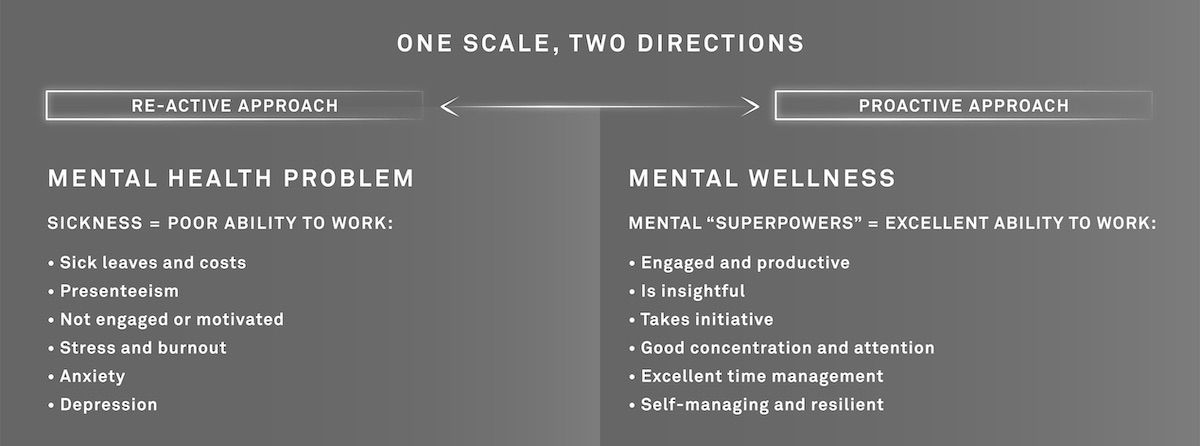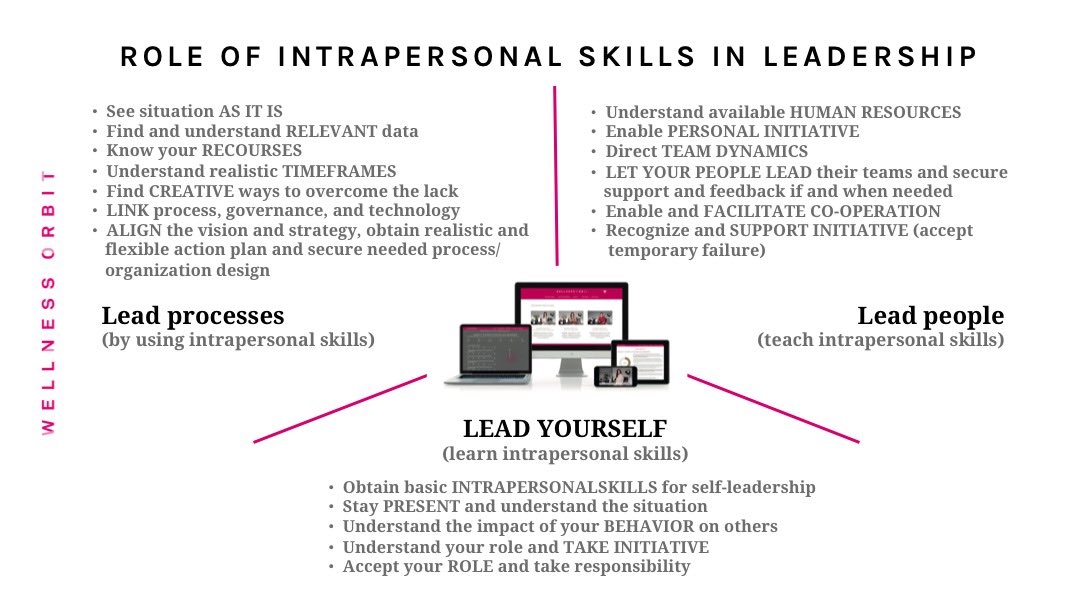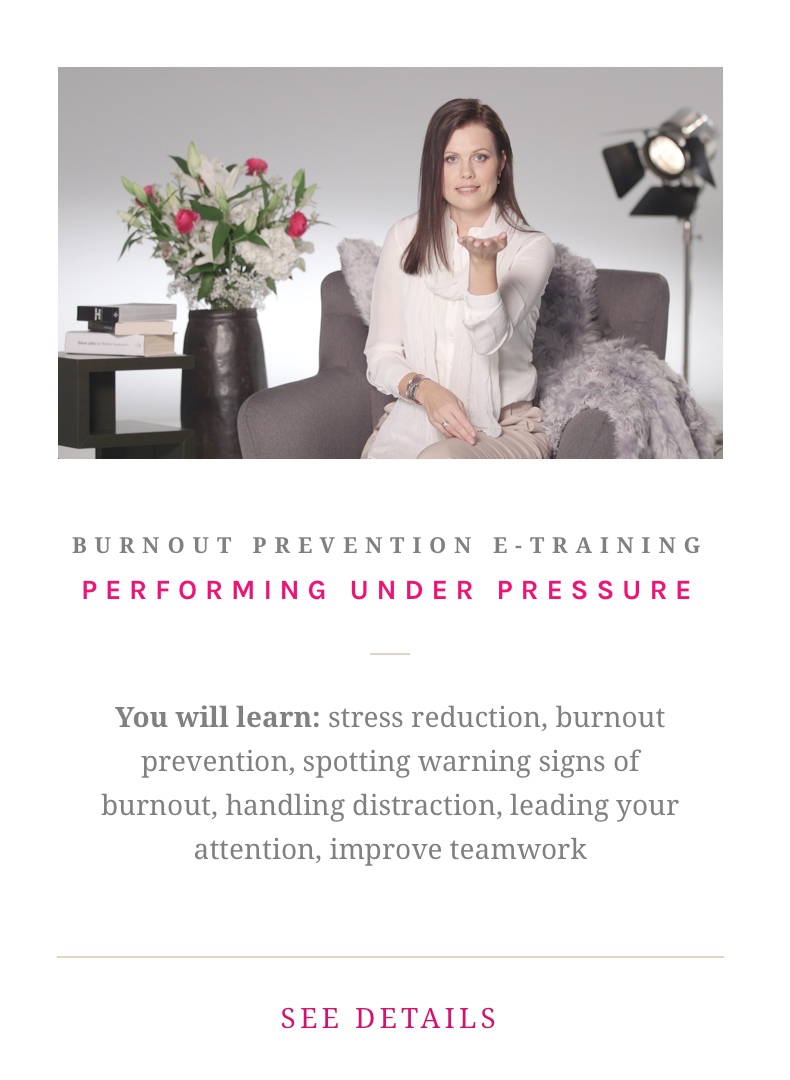The definition of Mental Wellness and the importance of mental wellbeing in the work context
Mental wellness, as a term, defines the proactive approach to mental health. However, there is more than meets the eye.
The fundamental sense of wellbeing leads to happiness and inner peace. Being calm and possessing a fit mind is what drives exceptional work results.
In a work context, you should associate mental wellness with different types of activities that allow you as an individual to work productively and stay mentally sharp. Even when times are troublesome and there are challenges, mental wellness enables you to keep inner peace and quietness and act adequately.
A healthy mind can focus, take problems as challenges, and solve situations for everyone's benefit.
Mental wellness as the foundation of success
Mental wellness at work is much more than focusing on our mental or cognitive functioning.
Mental wellbeing is solid when founded on intrapersonal skills, skills allowing us all to lead all our inner processes, like our thoughts and emotions, at will.
Mental wellness is the foundation of good interpersonal relationships with colleagues or customers.
When leaders and employees all have excellent mental wellness, it enables them to secure a well-functioning team that can successfully solve any challenge.
Overcoming challenges in work situations is key to innovation, productivity, and business success in the broadest sense.
Every so often, the term mental wellness is mixed up with the term mental health, but the two are very different, as we open up on our homepage section about mental wellness and the graph below.

The synonym for the term mental wellness could be mental well-being. Cognitive wellbeing here is the inner state that allows you to feel well.
The word 'mental' is essentially a progressive word, hinting at our ability to do mental work. As we know well, most of today's work represents mental work or includes various mental processes.
WHY DOES MENTAL WELLNESS AT WORK MATTER?
When we are stressed, our work engagement drops. When we are anxious, we fail to concentrate. When we are nearing burnout, we make mistakes. When we experience depression or anxiety or other mental health issues, performing our work and communicating with others becomes an enormous challenge.
However, most workplaces currently don't focus on training their staff's mental wellness. Thus, spiritual energy and mental wellbeing level drop.
Training mental wellness proactively allows people to prevent problems early on and maintain their inner domain fit and empowered.
Mental wellness is an investment
When you have mental sharpness, you make wise decisions. You know it by personal experience.
It is easy to solve any task when your mind has rested well, and you love what you do and have trained your mind to stick to the topic.
When you have had mental strength training, you are unafraid of challenging situations. You know that things around you can be tough. You know difficulties may pile up. However, you also know you aren't those difficulties, and your inner reserves allow you to seek solutions.
It is your inner wellness that allows you to do things well in the external (business) world.

Mental wellness as an efficient internal resource
Your mental wellness represents your own internal resource that assists you to think, feel, connect, and function effectively. Mental wellness in that sense should be seen as your unique and individual ability.
Mental wellness isn't a campaign. Securing mental wellness is an active, dynamic process that helps you to be resilient, learn, grow and thrive. Keeping your mind fit and well demands individual initiative and personal action. Thus, you can't make a workplace well by rules or regulations.
Yes, you can map psychological risk factors and identify stressors. However, you mostly can't eliminate them. Work is work because it is about doing something challenging and demanding for the benefit of others.
DIFFERENT LEVELS OF MENTAL WELLNESS
Mental wellness is every person’s individual inner resource. Keeping a mind fit and well always requires initiative and conscious action.
Individual mental wellness demands activities on multiple levels:
- Physical level: Notice what your inner processes do with your physical body and its fitness; this becomes significant when you are tired. Mental wellness on a physical level is about giving your body some active movement. It is about eating well, resting well and sleeping well.
- Emotional level: Observe what you feel and train yourself on how you can choose suitable emotions and lead your own emotions at will.
- Mental level: Notice what you think and imagine. It is about knowing how to process your thoughts and imaginations in various work and life situations. For example, efficient working is about understanding and analyzing information efficiently.
- Conscious level: Knowing how to become aware of the numerous processes around you and within your own mind. Using your awareness at will is the key to developing and acquiring excellent intrapersonal skills. Mastering awareness allows you to notice, compare and make decisions.
Mental wellness on all those levels should be associated with the concept of well-being on the broadest scale. It is about ease of being based on intrapersonal self-leadership.
A higher level of such self-discovery is possible with the Practical Consciousness method that we recommend as a follow-up to Wellness Orbit online learning courses.
TRAINING MENTAL WELLNESS = LEARNING INTRAPERSONAL SKILLS
Training your mental wellness is possible only when we acquire basic intrapersonal education. Learning allows the development of inner skills. Skills are what matter in practical work situations.
The difference between an average person and an expert is simple. The expert possesses skills to overcome problems in his or her area of expertise.
While we train and master professional skills, we often don't train intrapersonal skills and self-leadership skills. Thus, we fail to master our initiative and responsibilities with ease.
Self-leadership skills on the graph below represent our foundational skills for leading others and processes around us. Intrapersonal skills allow you to manage things and situations.

Keeping our mental wellness is a lifelong process.
Workplaces should see mental wellness as their proactive strategy to strengthen employee mental sharpness, overall fitness and employee engagement.
People who are mentally and emotionally well can utilize their own psychological resources to support business and even social causes.
Your workplace mental wellness approach is efficient when it is integrated and supports the holistic nature of human beings, regardless of age and gender. Keeping your mind well and fit represents a lifelong process.
Your fit mind affects your body and vice versa. However, your physical fitness alone isn't enough for your mental wellness.
Otherwise, athletes and physically strong people would never experience stress or mental health issues. Fortunately, many action heroes from the movie world and athletes who win medals for their achievements have busted that myth.
That is why we all should train our minds. Including you and your colleagues, regardless of their position.
Our fit and sharp mind originates from the realm of consciousness and thus is easy to secure by learning awareness-based intrapersonal skills.
Every skill that the person has is only his or hers to use. Skills aren't impersonal.
Skills are always personal and always dependent on the person's ability to learn and practice. That is why training mental wellness demands personal training for each employee.
Just like every pilot needs skills to fly, you need intrapersonal skills to drive your life and work the best possible way.

Conclusion
This mental wellness gym for developing your mind/brain represents the most efficient solution. It allows everyone to learn and practice staying mentally fit, well and sharp. It is like going to the gym, only instead of your body, you train your mind.
This training environment here is unique as it trains individual skills and allows people to thrive. And best of all, we do it at easily affordable prices.
Why should you care?
When people in your team thrive, your team thrives. When you thrive, your family thrives.
When your team thrives, it can offer goods and services that allow your customers to thrive.
Mental wellness represents a win-win investment. When approached proactively, it allows each person to thrive. It is time to make thriving contagious.
In today's busy (business) world, we need mental wellness contagion! ... without inner wellbeing, we can't end stress, burnout, and the ongoing mental health pandemic – the outcomes of global lockdowns and total lack of intrapersonal education at schools.

This blog post is by Kaur Lass





